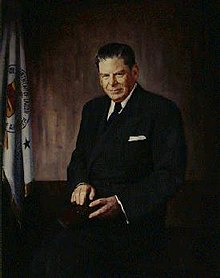James P. Mitchell
James Paul Mitchell (born November 12, 1900 in Elizabeth , New Jersey , † October 19, 1964 in New York City ) was an American politician of the Democratic Party .
biography
James Mitchells was born into a family of Irish descent, many of whom were reporters or engaged in other social activities. His uncle was the well-known Oscar winner Thomas Mitchell . Mitchell was first special advisor for work to the director of the New York State Employment Promotion Administration and then from 1942 to 1945 director of the United States Army's industrial personnel department . On April 6, 1953 he was appointed Assistant ( Assistant Secretary ) of the Army Secretary ( Secretary of the Army ) Robert T. Stevens appointed and as such was responsible for personnel and reservists affairs.
On October 9, 1953 it convened the Republican US President Dwight D. Eisenhower as the successor to Martin Patrick Durkin as labor minister ( Secretary of Labor ) in his Cabinet . In this role, he said on 20 September 1954, the trade union organization American Federation of Labor from (AFL), to submit the US labor market an objective evaluation of the performance of the government Eisenhower terms. Relations between Mitchell, the AFL, and the other major umbrella union Congress of Industrial Organizations (CIO) subsequently became strained. His opponents on the union side were the president of the AFL, George Meany , and the president of the CIO, Walter Reuther . On February 1, 1955, the Executive Council of the AFL accused him of tolerating labor law violations caused by low wages in government construction work. However, Mitchell immediately denied these allegations. On the other hand, he called for the introduction of a minimum hourly wage of 90 cents, while AFL and CIO officials demanded a minimum hourly wage of US $ 1.25 . In August 1955, the US Congress finally set the minimum wage at $ 1.
The 1958 draft labor law presented by the Eisenhower administration was essentially written by Mitchell. In it he spoke out in favor of reforms in the trade unions. In particular, he called for the introduction of annual financial and accountability reports, the election of local union officials by direct and secret elections, and the election of national union leaders also by direct and secret elections or by delegates. However, the bill was rejected on August 18, 1958 by the United States House of Representatives .
After Eisenhower's tenure ended, Mitchell left the government on January 21, 1961. In November of the same year he joined the Republicans, meanwhile, as their candidate for the election of governor of New Jersey. He achieved a share of the vote of 48.7 percent and was thus just beaten in second place behind the Democrat Richard J. Hughes .
Individual evidence
Web links
- Biography at the Ministry of Labor (English)
- James P. Mitchell in nndb (English)
- rulers.org
- James P. Mitchell in the Miller Center of Public Affairs of the University of Virginia (English)
| personal data | |
|---|---|
| SURNAME | Mitchell, James P. |
| ALTERNATIVE NAMES | Mitchell, James Paul (full name) |
| BRIEF DESCRIPTION | American politician (Democratic Party) |
| DATE OF BIRTH | November 12, 1900 |
| PLACE OF BIRTH | Elizabeth , New Jersey |
| DATE OF DEATH | October 19, 1964 |
| Place of death | New York City |

